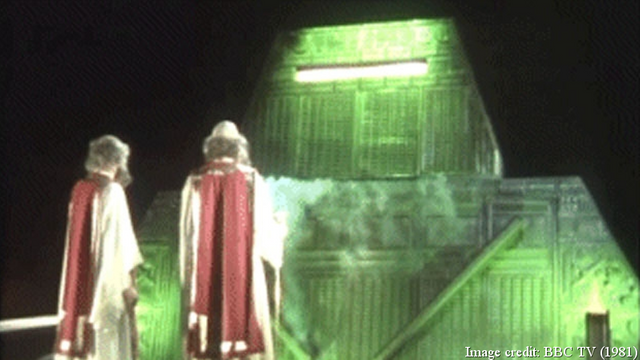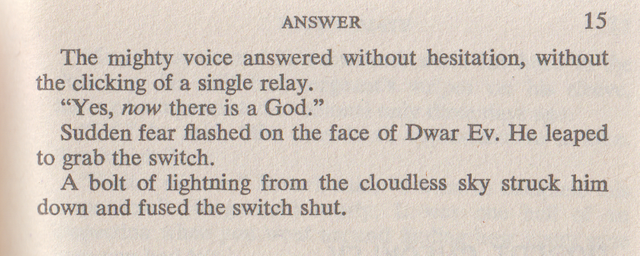Divine in(ter)vention: a computing myth solved

A WELL-KNOWN legend among scientists and computer geeks is an apocryphal science-fiction story in which humans build an unimaginably powerful computer to answer the question of whether God exists, and the computer instead decides that it is God. But no-one is able to identify the story. Ironically, I can answer this age-old question: the story really did exist, and still does.
Some recent research of mine proves once and for all that it was Answer, published in 1954. The author was Fredric Brown (1906 - 1972). The conclusion to the story is as follows.

How did Brown's story ever get forgotten? In my personal opinion, the author's big mistake was to write a story so pithy (at barely two pages long!) that it could be told as a joke instead. A case of being a bit too successful, perhaps. But a famous scene in The Hitchhiker's Guide to the Galaxy (by Douglas Adams) is unquestionably a parody of Brown's tale. Adams's parody may also have contributed to the eclipse of Brown's original story.

In Adams's masterpiece (a radio series, then a book, then a TV series, and most recently a movie), the people of a planet called Magrathea build a giant computer called Deep Thought to answer the Ultimate Question of Life, the Universe, and Everything. The image at the top of this page shows Deep Thought, as seen in the 1981 TV series of Hitchhiker's Guide. After several millions of years calculating, the computer declares that the answer is 42. So another computer, even more powerful, has to be built to figure out what the question was in the first place.
You can see Adams's brief nod towards Brown's story in the following bit of dialogue from The Hitch-Hiker's Guide. The context is that militant philosophers have broken into Deep Thought's control room to protest against the threat to their professional livelihoods.
"You just let the machines get on with the adding up," warned Majikthise, "and we'll take care of the eternal verities thank you very much. You want to check your legal position you do mate. Under law the Quest for Ultimate Truth is quite clearly the inalienable prerogative of your working thinkers. Any bloody machine goes and actually finds it and we're straight out of a job aren't we? I mean what's the use of our sitting up half the night arguing that there may or may not be a God if this machine only goes and gives us his bleeding phone number the next morning?"Adams's work is much-loved and revered by science fiction aficionados. The name Deep Thought was bestowed upon one of earliest chess-playing supercomputers, in an affectionate hommage to Adams. So this is another ripple from Brown's original story. I've often wondered whether the founders of Google took their inspiration from Adams's reference to another supercomputer called "The Googleplex Star Thinker in the Seventh Galaxy of Light and Ingenuity." A big clue to Google's affection for Douglas Adams is the fact that if you ask its search engine for "the answer to the ultimate question of life, the universe, and everything" you get... well, try it yourself. Another possible reason that Fredric Brown's short story was forgotten is that it fitted too neatly into a 20th Century genre of jokes about how dangerously stupid computers could be. There are many such far-fetched tales. The best-known is the one about the computer that supposedly translated the English expression "Out of sight, out of mind" into Russian as "Invisible Maniac." Another is the (supposed) supercomputer owned by the Pentagon, which in 1967 was fed all available data about the Vietnam War, with a view to finding out when the US would win – the answer, according to the computer, was 1965. This one has a certain dark humor to it, because the background to the joke is that (in real life) the military was falsifying and exaggerating its performance in the conflict for political reasons, and the (fictional) computer was oblivious to this deception. And what of Fredric Brown himself? He is by no means obscure, in fact he is generally regarded as an influential figure in the development of science-fiction as a genre. How his 1954 Answer slipped from public awareness isn't completely clear. But hopefully, this Steemit post has started the process of excavating the truth and giving Brown the recognition he deserves for this gem of story – at long last. ◎ All rights reserved
You've got a free upvote from witness fuli.
Peace & Love!